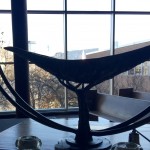God must be replaced with a symbol capable of generating a different and more productive response and organizational pattern to life.
 Anthony B. Pinn, The End of God Talk: an African American Humanist Theology
Anthony B. Pinn, The End of God Talk: an African American Humanist Theology
I.
One thing we know about ritual is that we can’t escape it. From shaking hands to respectful calm in the TSA line, certain ritualized actions are expected, even required. When I talk about writing, I point out that writing flows best when accompanied with rituals—a certain time; a particular place; even a particular beverage and writing instrument.
We also know that human beings have long considered ritual important in contacting spirits unseen. In his autobiography, the Italian Renaissance artist Benvenuto Cellini revealed a secret ritual for conjuring the dead. The famously atheist philosopher Diagoras (5th Century BCE) published the rituals of the famously mysterious Eleusinian Mysteries and thereby got a price on his head. (Presumably his point had to do with how silly the ritual was when exposed to the light of day. It bears mentioning that the Eleusinian Mysteries continued despite Diagoras, until suppressed by Christians a thousand years later.)
When it comes to ritualized actions, I suppose the best conclusion is that it’s subjective: you get it or you don’t. If you’re not feelin’ it, you’re not feelin’ it. And visa versa.
II.
Perhaps the first thing that leaps to mind when we think about ritual is religion, though rites of passage and celebrations of seasons and historical events also figure large in the rituals of human community. (Though Cole Porter would quickly point out that even the bees do it.)
The prevailing attitude toward ritual is that practitioners of a ritual do one thing while thinking about something else—for example, certain Protestant Christians have bread and grape juice thinking about the body and blood of Jesus. Cellini drew a circle on the ground, thinking of building a wall of spiritual protection against the spirits he was conjuring. That sort of thing.
Clearly, people dismiss some rituals but embrace others. For example, someone who wouldn’t be caught dead at a worship service of any sort might enjoy graduations. The alternative wedding industry is built on the fact that those who dismiss traditional wedding rituals still hanker for ritual to mark that rite of passage.
As a minister of a humanist congregation, my concern is creating ritual without invoking squeamishness. After all, humanists tend to be about deconstructing dominant narratives, those of religion perhaps chief among them. Some, calling themselves secular humanists, avoid the trappings of religious ritual in any guise. Others, congregational humanists such as I, search for ways to ritualize, perhaps I should say “heighten,” collective experience without creating vertigo.
III.
I think it’s safe to say that ritual in human groups underlines the values of the group. Sociologist Emile Durkheim believed that ritual is an acting out and reinforcement of cultural norms, what he termed “collective conscience.” Ritual is the third element in Durkheim’s trinity of collective behavior:
1. a set of beliefs that define what is sacred and what is profane;
2. a gathering where these beliefs are reinforced communally,
3. and a ritualized action that cements the group.
I work from the assumption that a humanist community is an alternative community. A community where alternative values are the honored values: political and legal equity for all; preferential treatment for the historically marginalized; freedom of religion and from religion; the separation of the public and private spheres. A humanist community values compassion, acceptance, and equity.
What kind of ritual underlines these community values? For me, the goal of ritual in a humanist community is to “humanize the world,” as educator Paulo Freire put it. How? Freire said, “To exist, humanly, is to name the world” and “No one can say a true word alone—nor can s/he say it for another.” These ideas are my touchstones for humanist community ritual.
First to humanize the world by speaking truth about reality in community. Second, to say how this can be done in daily life. Paulo Freire also said, “There is no transformation without action.”
Durkheim’s collective consciousness is about an us and an other. Human psychology dictates that this demarkation is part of creating community. Other effects of shared ritual include deepened connection between participants; challenge in interpersonal relationships; and a good reminder of what the community values.
The establishment of ritual without reference to the sacred perhaps appears to Westerners as more difficult than it is. Confucianism, for example, has long practiced just this, as have various non-Western traditions. It’s not so difficult. It’s a change of direction from ritual aimed at the invisible to ritual affirming the visible—the ideal community, people outside the community, and the world itself.
More next week: Cheap Grace and Humanist Ritual











